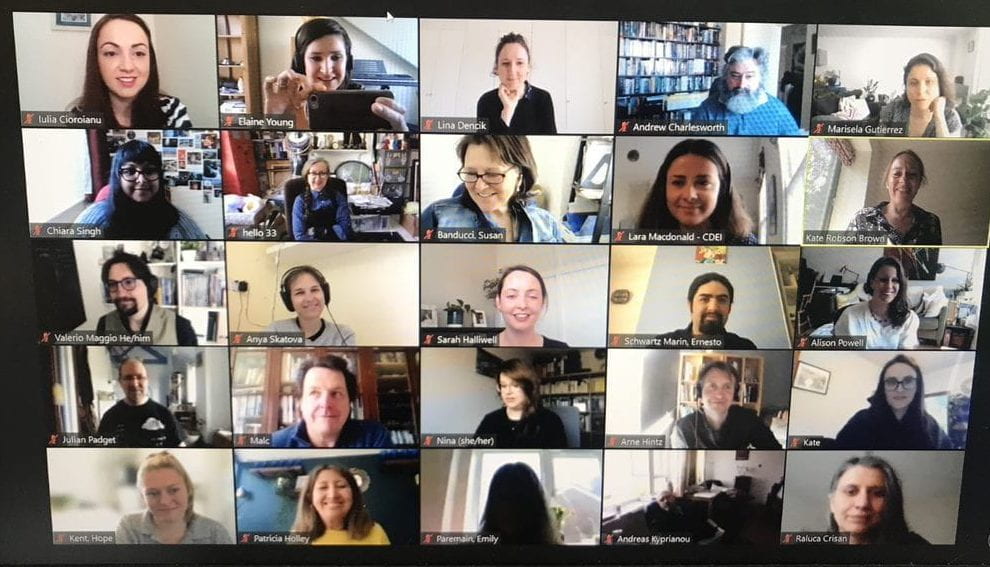 Researchers from across the UK are coming together for a climate data hackathon this June. The hackathon is a three-day virtual event organised by the University of Bristol’s Cabot Institute and Jean Golding Institute, in association with the Met Office and universities of Exeter, Leeds and UCL.
Researchers from across the UK are coming together for a climate data hackathon this June. The hackathon is a three-day virtual event organised by the University of Bristol’s Cabot Institute and Jean Golding Institute, in association with the Met Office and universities of Exeter, Leeds and UCL.
The aim of the hackathon is to produce cutting-edge research using data from the Climate Model Intercomparison Project (CMIP6), with the aim of showcasing outputs at the upcoming COP26 delegation in November, and through peer-reviewed publications. Topics range from climate change to oceanography, biogeochemistry, and more.
Dr Dann Mitchell is the Met Office Joint Chair in Climate Hazards at Bristol: “I’m delighted that we have received over one hundred applications to take part in our hackathon, it is a great chance for academics to experience research on topics outside of their comfort zone.”
Teams are being led by senior academics from Bristol and the partner universities, with assistance from data science experts at the Jean Golding Institute, the central hub for data science and data-intensive research at the University of Bristol.
The hackathon will take advantage of several online collaboration platforms, with code, visualisations and other outputs being shared openly on GitHub. Professor Kate Robson Brown, Director of the Jean Golding Institute commented: “Supporting open, accessible science and best practice in research is a key part of the work of the JGI. This event opens up areas of climate research to whole new groups of researchers and I’m encouraged by its popularity. I’m pleased we are able to provide a team of data scientists to support this exciting science.”
To ensure computational resources are available to all participants, the hackathon is being hosted on JASMIN, the UK’s data analysis facility for environmental science. Poppy Townsend, Communications Manager at JASMIN has been supporting the event: “JASMIN is a globally unique data analysis facility. It provides storage and compute facilities, enabling data-intensive environmental science for over 1,600 users. We are excited to be supporting a range of climate hackathons in the run up to COP26 and are pleased to see new and innovative uses of our JASMIN Notebook Service, launched in 2020. Making Python available through interactive Jupyter Notebooks helps open up data visualisation tools to a wider community, reducing barriers to scientific computing.”
Following the theme of sharing best practice, the hackathon team have also published a wide range of resources on their website, not only for participants but also for organisers of other virtual hackathon events. These include a guide to running an online event on JASMIN, an event checklist, and template forms, emails and resources, which have already been accessed by other Met Office partner universities who will be conducting their own hackathons in the build-up to COP26 later this year.
The CMIP6 Data Hackathon will take place between 2nd–4th June, and although places at the event are now finalised, you can stay updated by following #cmip6hackathon for live tweets as the event progresses. You can also get involved with one of our events. Just two weeks after, the Jean Golding Institute is hosting Data Week Online 2021. Running between 14th–18th June, Data Week is a week of complimentary workshops, renowned speakers and interactive events showcasing the latest in Data Science and AI. Everyone is welcome! You can register to attend a Data Week event by following the links on our website.
About the author: James Thomas is a data scientist at the Jean Golding Institute and member of the CMIP6 Data Hackathon organising team. His research interests include energy and the environment, and he is currently working on urban analytics projects with a focus on Net Zero and reducing health and well-being inequalities.


